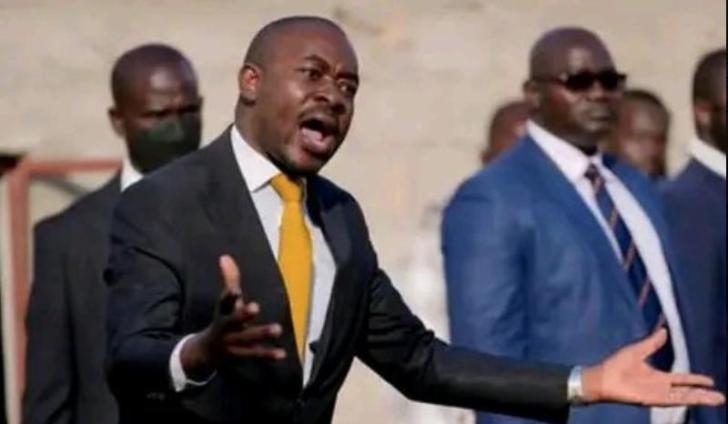News / Local
Chamisa denounces targeted summons
10 Dec 2024 at 13:47hrs |
0 Views

Former Citizen for Coalition Change leader Nelson Chamisa has voiced strong reservations about the legitimacy of a Harare City Commission inquiry chaired by (Rtd) Justice Maphosa Cheda. Chamisa was summoned on Monday to respond to allegations linking him to Harare City Council's operations - a process he described as unjust and politically motivated.
Chamisa stated that the commission, established by Mr Mnangagwa, was flawed in its foundation. Despite his reservations, he chose to attend the hearing out of courtesy and as an officer of the court.
Denial of Local Authority Involvement
At the inquiry, Chamisa dismissed claims of his involvement in Harare City Council's "regularisation process," emphasizing that he has no official role in local government.
"I am not a councillor, mayor, local government official, or part of the central government. Urban councils operate under the Urban Councils Act, and their decisions are made by statutory committees or full council—not by external political actors," he stated.
Chamisa criticized the use of an audio recording purportedly implicating him, calling its presentation amateurish and questioning its authenticity. He noted that the same recording also mentioned Mnangagwa and suggested that, by the same logic, the president should also be summoned.
Condemnation of Home Demolitions
Chamisa condemned the destruction of homes by local authorities, describing it as "criminal, sadistic, and inhumane." He attributed these actions to a systemic failure in leadership and governance, asserting that such measures represent a gross violation of human rights.
"This is not justice but evidence of leadership failure and a mockery of human rights. Bulldozing people's homes destroys lives and livelihoods, a crime that cannot be justified," he said.
Pattern of Misuse of Commissions
Drawing parallels to the 2018 Motlanthe Commission, Chamisa accused Mnangagwa's administration of using commissions as tools to divert attention from governance failures. He criticized the recurrent targeting of private individuals, including himself, based on speculative accusations.
"The principle is clear: he who alleges must prove. Summoning individuals without evidence undermines the rule of law," he said.
Call for Accountability
Chamisa emphasized the urgent need to tackle corruption, maladministration, and governance failures, which he identified as the root causes of Zimbabwe's urban decay. He called for genuine accountability, urging authorities to focus on those responsible for mismanagement rather than scapegoating individuals.
"Our towns and cities have become theatres of incompetence and impunity. This crisis demands action to hold the true culprits accountable," Chamisa concluded.
The Harare City Commission inquiry has sparked controversy, with critics viewing it as a politically driven attempt to target opposition leaders while deflecting from systemic governance challenges.
Chamisa stated that the commission, established by Mr Mnangagwa, was flawed in its foundation. Despite his reservations, he chose to attend the hearing out of courtesy and as an officer of the court.
Denial of Local Authority Involvement
At the inquiry, Chamisa dismissed claims of his involvement in Harare City Council's "regularisation process," emphasizing that he has no official role in local government.
"I am not a councillor, mayor, local government official, or part of the central government. Urban councils operate under the Urban Councils Act, and their decisions are made by statutory committees or full council—not by external political actors," he stated.
Chamisa criticized the use of an audio recording purportedly implicating him, calling its presentation amateurish and questioning its authenticity. He noted that the same recording also mentioned Mnangagwa and suggested that, by the same logic, the president should also be summoned.
Condemnation of Home Demolitions
Chamisa condemned the destruction of homes by local authorities, describing it as "criminal, sadistic, and inhumane." He attributed these actions to a systemic failure in leadership and governance, asserting that such measures represent a gross violation of human rights.
Pattern of Misuse of Commissions
Drawing parallels to the 2018 Motlanthe Commission, Chamisa accused Mnangagwa's administration of using commissions as tools to divert attention from governance failures. He criticized the recurrent targeting of private individuals, including himself, based on speculative accusations.
"The principle is clear: he who alleges must prove. Summoning individuals without evidence undermines the rule of law," he said.
Call for Accountability
Chamisa emphasized the urgent need to tackle corruption, maladministration, and governance failures, which he identified as the root causes of Zimbabwe's urban decay. He called for genuine accountability, urging authorities to focus on those responsible for mismanagement rather than scapegoating individuals.
"Our towns and cities have become theatres of incompetence and impunity. This crisis demands action to hold the true culprits accountable," Chamisa concluded.
The Harare City Commission inquiry has sparked controversy, with critics viewing it as a politically driven attempt to target opposition leaders while deflecting from systemic governance challenges.
Source - byo24news
Join the discussion
Loading comments…

































